The first contest for the 2024 Republican nomination ended up exactly where everyone thought it would. Trump won Iowa with just over 50% of the vote. He didn’t exceed expectations but neither did he fall below them. He won almost every county in the state and did better than he did in 2016 among groups like urban and suburban voters and college-educated voters, while his base of non-college and evangelical voters remained robust.
These early states were always a race for second place, and the other candidates ended up exactly where everyone thought they would, too. Governor Ron DeSantis landed in second place and former Ambassador Nikki Haley came in at a close third. Those who had hoped that Trump would underperform, revealing cracks in his invincibility, were disappointed. Those who hoped that DeSantis would continue his fall into third place and leave Haley in a one-on-one race against Trump were also disappointed.
So, now that the Iowa contest is over, what happens next?
The American race for a presidential nomination is unique in our politics because it is not one race but a sequence of races with each race building on or reacting to the one before it. So, the question now is — what does Iowa mean for New Hampshire? And what does New Hampshire mean for South Carolina, and so on?
Prior to the caucuses, Nikki Haley was on a roll in New Hampshire — holding onto and increasing her second place standing in the polls. New Hampshire is a very different Republican electorate than Iowa — more moderate and less dominated by evangelicals. Perhaps most important is the fact that it is easier for Independents to vote in the New Hampshire Republican primary than it is in Iowa.
These things allowed some (mostly Democrats) to speculate that Haley could beat Trump there. And while that is still possible, last night’s solid Trump win took some of the wind out of those sails. Chris Christie’s withdrawal from the race might add some votes to Haley’s numbers, but Vivek Ramaswamy’s withdrawal last night might add some to Trump’s numbers. And DeSantis saved himself from oblivion by coming in second in Iowa. Thus, while prospects of an outright Haley win have dimmed, if she comes in a close second to Trump, she might just win the expectations race.
Haley left for New Hampshire from Iowa, where she could be seen delivering a Reagan-esque message of hope and unity. Meanwhile, Trump left for yet another appearance in a courtroom in New York City. Ordinarily this would be bad news for a presidential candidate, but to the amazement of many, Trump’s courtroom appearances seem to be a positive part of his campaign strategy.
After New Hampshire, the next big contest is South Carolina where Haley faces the dilemma all presidential candidates face in their home states. If she somehow beats Trump, there it will be interpreted as somewhat inconsequential since it’s her home state. If she doesn’t, it will be one more step towards the nomination for Trump.
And then the race changes. Until the end of February, only a handful of delegates to the Republican convention will have been chosen. But on February 27th, Michigan will be the first big, diverse state (both racially and economically) to weigh in. However, in a plan designed for Donald Trump by the Michigan Republican state committee, most of Michigan’s 55 delegates (39) will be decided in caucus meetings, before the open primary.
And then comes “Super Tuesday,” so-called because of the large number of states (16) that hold primaries on that day — including the very big states of Texas and California. Nearly half of those states are in the South and are likely to have conservative Republican electorates that look a lot like that of Iowa’s. In addition, many of these states have systems that allocate delegates either “winner-takes-all” by state or “winner-takes-more” by congressional district. Trump should be able to rack up enough of a delegate lead to counteract some of the New England states that also fall on that day.
The second thing that makes the presidential nomination system unique is that, in addition to its sequential nature, the votes in the primaries are important because they determine delegates to the Republican convention. For Trump, the magic number is 1,215 — the number of delegates he needs to clinch the Republican nomination. All the Republican contests prior to Super Tuesday add up to only 23% of the Republican delegates to the convention. But, including the primaries that happen one week after Super Tuesday, it will be possible for someone to reach the magic number — at which point most other candidates will bow to reality.
So, the next two months are likely to settle the question once and for all: Will Trump wrap up the Republican nomination early and start the battle against Joe Biden by mid-March or will he face a fight from someone (most likely Haley) all the way to the convention?
For an insightful discussion on this topic, join us for a Brookings webinar: Key takeaways from the 2024 Iowa Caucuses.
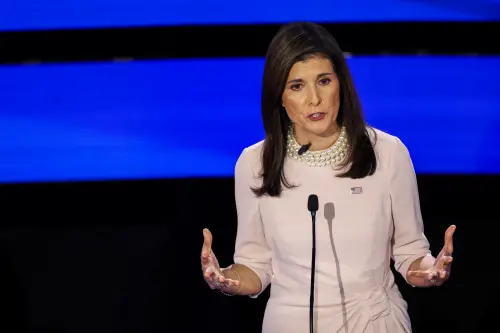
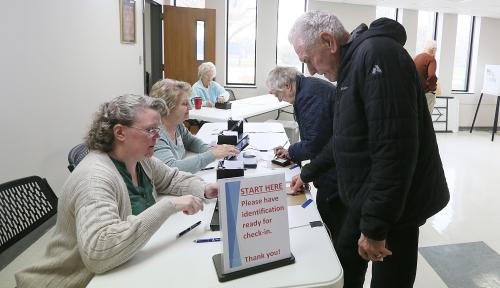
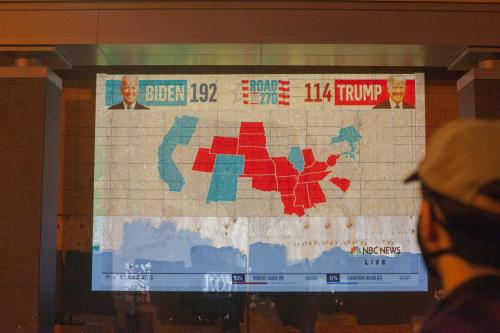


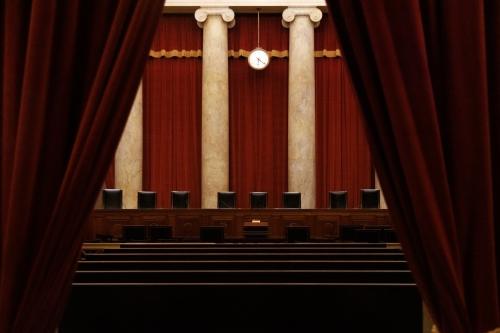
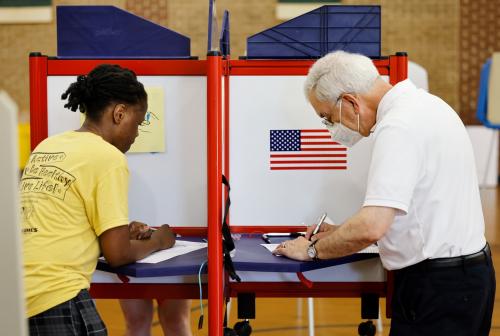
Commentary
Trump wins Iowa — no surprises there. What happens next?
January 16, 2024